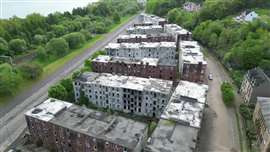‘Scotland’s Chernobyl’ finally set to be demolished
03 September 2024
A local council in Scotland is to begin tendering for a demolition contractor, to undertake the first phase of major demolition works to a rundown residential estate dubbed ‘Scotland’s Chernobyl’.
 Clune Park has been derelict for years. (PHOTO: Reuters/South West News Service)
Clune Park has been derelict for years. (PHOTO: Reuters/South West News Service)
Inverclyde Council has confirmed that it is to tear down the derelict Clune Park estate in Port Glasgow, following the issuing of 138 dangerous building notices for residences in 15 of the site’s 45 four-storey blocks.
Now, the 138 flats, along with the estate’s a former Clune Park school and church - all of which have suffered serious damage over the years as a result of anti-social behaviour, will soon be brought down.
The first of the residential buildings were built in 1905 to house workers for the local shipyard workers. While more blocks were added to the site in the following decades, the post-World War II decline of area’s shipbuilding industry has ultimately resulted in the site becoming all but abandoned.
According to local media reports, there are around five individuals still in residence on the estate, which comprises around 450 individual apartments in total.
Another two tranches of dangerous buildings notices have also been issued by Inverclyde Council for apartments in the remaining tenements, although the number of properties involved are not yet known.
Councillor Michael McCormick, Inverclyde Council’s convener of Environment and Regeneration, said: “This is a significant milestone for Clune Park and one that I’m sure will be welcomed by the majority of people in Inverclyde and particularly Port Glasgow residents.
“The council has a legal duty to ensure buildings across Inverclyde are safe and properly maintained and a responsibility to act accordingly if and when properties do not meet the necessary standards.
“Following extensive checks by our own building standards team and external surveyors, dangerous buildings notices were served on an initial 138 properties and with no appeals having been received, a demolition contractor will now be appointed to demolish these residential properties, if these works are not carried out by the owners, as well as the former school and church, which are in the council’s ownership.
“While progress to regenerate Clune Park has been incredibly difficult, a huge amount of work has been taking place in the background and I would like to thank all involved for their extensive and diligent work.”
The council has been proactively acquiring properties in Clune Park for a number of years and now owns over half the estate, on which further investigations are taking place to identify other potentially dangerous buildings.
CONNECT WITH THE TEAM





